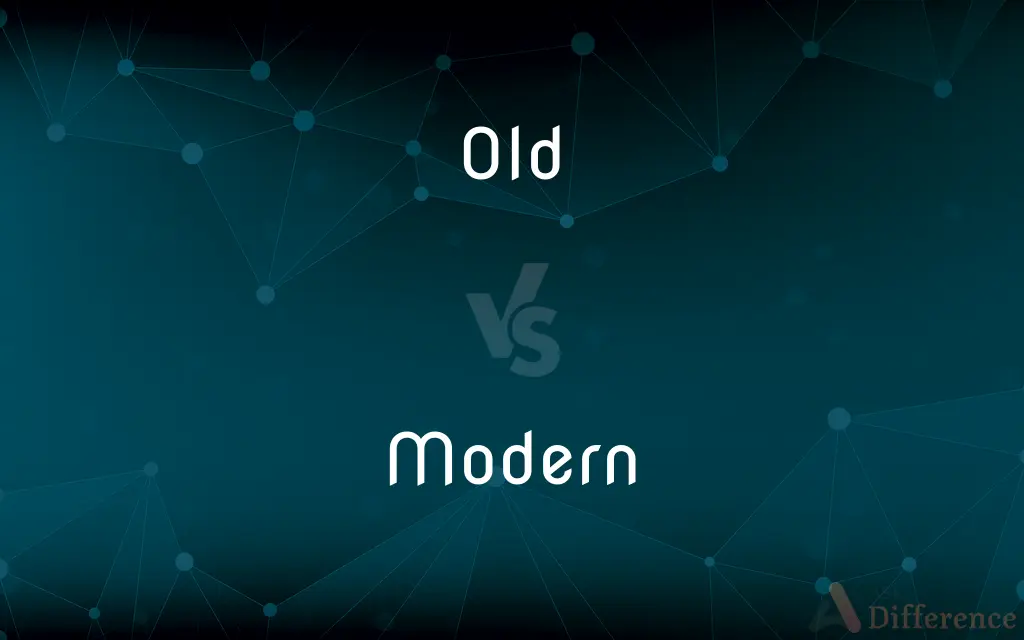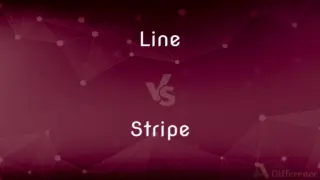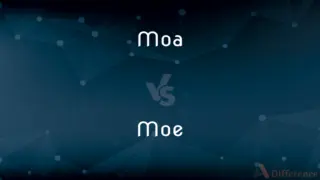Old vs. Modern — What's the Difference?
Edited by Tayyaba Rehman — By Maham Liaqat — Updated on March 8, 2024
Old often refers to something from the past with historical or aged attributes, whereas modern signifies current trends, technologies, or ideas, embodying a contemporary or futuristic aspect.

Difference Between Old and Modern
Table of Contents
ADVERTISEMENT
Key Differences
Old typically denotes things that belong to a time long past, often characterized by historical significance or bygone styles. For instance, old architecture showcases traditional designs and construction techniques of its era. On the other hand, modern is associated with the present or recent times, often reflecting current trends, innovations, or contemporary designs, as seen in modern buildings that emphasize minimalist aesthetics and the use of advanced materials.
In terms of technology, old can imply outdated or superseded by newer advancements, suggesting limited functionality or efficiency compared to current standards. Vintage cars, for example, while prized for their historical value, might lack the performance and safety features of modern vehicles, which are equipped with the latest technology for better efficiency, safety, and comfort.
Culturally, old traditions and practices are rooted in heritage and history, often preserved for their cultural significance despite the advent of modern alternatives that might offer practical benefits. Modern culture, however, is characterized by evolving norms and values that reflect current societal trends and advancements, often embracing diversity and innovation.
In the context of ideas or philosophies, old can refer to established beliefs or theories that have been foundational to human thought for centuries. Conversely, modern ideologies often challenge traditional viewpoints, promoting new ways of thinking influenced by recent discoveries, societal changes, and technological progress.
When it comes to fashion, old styles often resurface as vintage or retro trends, celebrated for their nostalgia and aesthetic appeal from a past era. Modern fashion, however, is constantly evolving, influenced by global trends, technological innovations in textiles, and dynamic cultural expressions, showcasing a blend of futuristic designs and contemporary sensibilities.
ADVERTISEMENT
Comparison Chart
Time Period
Pertains to the distant past
Relates to the present or recent past
Characteristics
Historical, traditional, possibly outdated
Contemporary, innovative, trending
Technology
May be outdated or superseded
Incorporates latest advancements
Cultural Relevance
Rooted in heritage and tradition
Reflects current norms and values
Ideas/Philosophies
Established, foundational beliefs
New, challenging traditional views
Compare with Definitions
Old
Belonging to a former time or era.
The old castle's ruins told stories of a bygone age.
Modern
Characterized by the use of the latest techniques or ideas.
The artist's modern approach was innovative and bold.
Old
Traditional or no longer in general use.
They still practiced old methods of farming.
Modern
Relating to the present or recent times.
Modern technology has transformed communication.
Old
Outdated or replaced by something newer.
He finally replaced his old computer with a new model.
Modern
Current or contemporary in style.
The modern architecture of the building stood out in the historic district.
Old
Showing the effects of age.
The old manuscript was fragile and needed careful handling.
Modern
Reflecting current trends or preferences.
Her modern taste in music spans various genres.
Old
Of long standing or acquaintance.
She visited her old hometown to reminisce about her childhood.
Modern
Involving the latest innovations or ideas.
The conference focused on modern solutions to environmental challenges.
Old
Having lived for a long time; no longer young
The old man lay propped up on cushions
Modern
Of or relating to recent times or the present
Modern history.
Old
Belonging to the past; former
Valuation under the old rating system was inexact
Modern
Characteristic or expressive of recent times or the present; contemporary or up-to-date
A modern lifestyle.
A modern way of thinking.
Old
Of a specified age
A seven-month-old baby
He was fourteetn years old
Modern
Of or relating to a recently developed or advanced style, technique, or technology
Modern art.
Modern medicine.
Old
Used to express affection, familiarity, or contempt
Good old Mum
I didn't like playing with silly old dolls
Modern
Avant-garde; experimental.
Old
Having lived or existed for a relatively long time; far advanced in years or life.
Modern
Often Modern(Linguistics) Of, relating to, or being a living language or group of languages
Modern Italian.
Modern Romance languages.
Old
Relatively advanced in age
Pamela is our oldest child.
Modern
One who lives in modern times.
Old
Made long ago; in existence for many years
An old book.
Modern
One who has modern ideas, standards, or beliefs.
Old
Of or relating to a long life or to people who have had long lives
A ripe old age.
Modern
(Printing) Any of a variety of typefaces characterized by strongly contrasted heavy and thin parts.
Old
Having or exhibiting the physical characteristics of age
A prematurely old face.
Modern
Pertaining to a current or recent time and style; not ancient.
Our online interactive game is a modern approach to teaching about gum disease.
Although it was built in the 1600s, the building still has a very modern look.
Old
Having or exhibiting the wisdom of age; mature
A child who is old for his years.
Modern
(history) Pertaining to the modern period (c.1800 to contemporary times), particularly in academic historiography.
Old
Having lived or existed for a specified length of time
She was 12 years old.
Modern
Someone who lives in modern times.
Old
Exhibiting the effects of time or long use; worn
An old coat.
Modern
Of or pertaining to the present time, or time not long past; late; not ancient or remote in past time; of recent period; as, modern days, ages, or time; modern authors; modern fashions; modern taste; modern practice.
Old
Known through long acquaintance; long familiar
An old friend.
Modern
New and common; trite; commonplace.
We have our philosophical persons, to make modern and familiar, things supernatural and causeless.
Old
Skilled or able through long experience; practiced
He is an old hand at doing home repairs.
Modern
A person of modern times; - opposed to ancient.
Old
Belonging to a remote or former period in history; ancient
Old fossils.
Modern
A contemporary person
Old
Belonging to or being of an earlier time
Her old classmates.
Modern
A typeface (based on an 18th century design by Gianbattista Bodoni) distinguished by regular shape and hairline serifs and heavy downstrokes
Old
Often Old Being the earlier or earliest of two or more related objects, stages, versions, or periods.
Modern
Belonging to the modern era; since the Middle Ages;
Modern art
Modern furniture
Modern history
Totem poles are modern rather than prehistoric
Old
Having become slower in flow and less vigorous in action. Used of a river.
Modern
Relating to a recently developed fashion or style;
Their offices are in a modern skyscraper
Tables in modernistic designs
Old
Having become simpler in form and of lower relief. Used of a landform.
Modern
Characteristic of present-day art and music and literature and architecture
Old
Used as an intensive
Come back any old time. Don't give me any ol' excuse.
Modern
Ahead of the times;
The advanced teaching methods
Had advanced views on the subject
A forward-looking corporation
Is British industry innovative enough?
Old
Used to express affection or familiarity
Good ol' Sam.
Modern
Used of a living language; being the current stage in its development;
Modern English
New Hebrew is Israeli Hebrew
Old
An individual of a specified age
A five-year-old.
Old
Old people considered as a group. Used with the
Caring for the old.
Old
Former times; yore
In days of old.
Old
Of an object, concept, relationship, etc., having existed for a relatively long period of time.
An old abandoned building
An old friend
Old
Of a living being, having lived for most of the expected years.
A wrinkled old man
Old
Of a perishable item, having existed for most of, or more than, its shelf life.
An old loaf of bread
Old
Of a species or language, belonging to a lineage that is distantly related others
The ginkgo is one of the oldest living trees
Basque is the oldest language in Europe
Old
Having been used and thus no longer new or unused.
I find that an old toothbrush is good to clean the keyboard with.
Old
Having existed or lived for the specified time.
How old are they? She’s five years old and he's seven. We also have a young teen and a two-year-old child.
My great-grandfather lived to be a hundred and one years old.
Old
(heading) Of an earlier time.
Old
Former, previous.
My new car is not as good as my old one.
A school reunion for Old Etonians
Old
That is no longer in existence.
The footpath follows the route of an old railway line.
Old
Obsolete; out-of-date.
That is the old way of doing things; now we do it this way.
Old
Familiar.
When he got drunk and quarrelsome they just gave him the old heave-ho.
Old
(UK) Being a graduate or alumnus of a school, especially a public school.
Old
Tiresome after prolonged repetition.
Your constant pestering is getting old.
Old
Said of subdued colors, particularly reds, pinks and oranges, as if they had faded over time.
Old
A grammatical intensifier, often used in describing something positive, and combined with another adjective.
We're having a good old time.
My next car will be a big old SUV.
My wife makes the best little old apple pie in Texas.
Any old
Old
(obsolete) Excessive, abundant.
Old
|invariable plural only}} People who are old; old beings; the older generation, taken as a group.
A civilised society should always look after the old in the community.
Old
(slang) A person older than oneself, especially an adult in relation to a teenager.
Old
One's parents.
I had to sneak out to meet my girlfriend and tell the olds I was going to the library.
Old
A typically dark-coloured lager brewed by the traditional top-fermentation method.
Old
Open country.
Old
Not young; advanced far in years or life; having lived till toward the end of the ordinary term of living; as, an old man; an old age; an old horse; an old tree.
Let not old age disgrace my high desire.
The melancholy news that we grow old.
Old
Not new or fresh; not recently made or produced; having existed for a long time; as, old wine; an old friendship.
Old
Formerly existing; ancient; not modern; preceding; original; as, an old law; an old custom; an old promise.
Old
Continued in life; advanced in the course of existence; having (a certain) length of existence; - designating the age of a person or thing; as, an infant a few hours old; a cathedral centuries old.
And Pharaoh said unto Jacob, How old art thou?
Old
Long practiced; hence, skilled; experienced; cunning; as, an old offender; old in vice.
Vane, young in years, but in sage counsel old.
Old
Long cultivated; as, an old farm; old land, as opposed to new land, that is, to land lately cleared.
Old
Worn out; weakened or exhausted by use; past usefulness; as, old shoes; old clothes.
Old
More than enough; abundant.
If a man were porter of hell gate, he should have old turning the key.
Old
Aged; antiquated; hence, wanting in the mental vigor or other qualities belonging to youth; - used disparagingly as a term of reproach.
Old
Old-fashioned; wonted; customary; as of old; as, the good old times; hence, colloquially, gay; jolly.
Old
Used colloquially as a term of cordiality and familiarity.
Old
Past times (especially in the phrase `in days of old')
Old
(used especially of persons) having lived for a relatively long time or attained a specific age; especially not young; often used as a combining form to indicate an age as specified as in `a week-old baby';
An old man's eagle mind
His mother is very old
A ripe old age
How old are you?
Old
Of long duration; not new;
Old tradition
Old house
Old wine
Old country
Old friendships
Old money
Old
Of an earlier time;
His old classmates
Old
(used for emphasis) very familiar;
Good old boy
Same old story
Old
Lacking originality or spontaneity; no longer new;
Moth-eaten theories about race
Old
Just preceding something else in time or order;
The previous owner
My old house was larger
Old
Of a very early stage in development;
Old English is also called Anglo Saxon
Old High German is High German from the middle of the 9th to the end of the 11th century
Old
Old in experience;
An old offender
The older soldiers
Old
Used informally especially for emphasis;
A real honest-to-god live cowboy
Had us a high old time
Went upriver to look at a sure-enough fish wheel
Common Curiosities
Does "modern" always imply better functionality or quality?
Modern generally suggests improved functionality or efficiency due to advancements, but "better" can be subjective, especially considering aesthetic or cultural preferences.
Is the transition from old to modern always linear or progressive?
The transition isn't always linear; it can be cyclical with old ideas or styles resurfacing, and what's considered modern can vary across cultures and contexts.
Can something old become modern again?
Yes, old styles or ideas can resurface and be adapted into modern contexts, often seen in fashion, design, and culture, as vintage or retro trends.
Can modern technologies preserve or enhance old traditions?
Yes, modern technologies can help preserve old traditions through digitization, restoration, and innovative applications that keep traditions alive for future generations.
Can an old artifact be considered modern art?
An old artifact can be recontextualized as modern art, especially when placed in contemporary settings or interpreted through modern artistic lenses, challenging traditional distinctions.
How do old and modern coexist in today's world?
Old and modern often coexist, blending traditional values with contemporary practices, seen in architecture, fashion, and technology, enriching cultural and social landscapes.
Can modern design incorporate old elements?
Modern design often incorporates old elements, blending nostalgia with contemporary aesthetics to create unique, hybrid styles.
How does the pace of technological advancement impact the distinction between old and modern?
Rapid technological advancements can shorten the lifespan of what's considered modern, quickly rendering recent innovations old as new developments arise.
How do old and modern approaches to education differ?
Old approaches often emphasize rote learning and traditional knowledge, whereas modern education focuses on critical thinking, creativity, and the integration of technology.
Do old philosophies still have relevance in the modern world?
Many old philosophies remain relevant, providing foundational insights into ethics, society, and human nature, influencing modern thought and debates.
How do perceptions of old and modern vary across cultures?
Perceptions can vary significantly, as what's considered old or modern can depend on a culture's history, traditions, and the pace of its technological and social changes.
Can old buildings be adapted for modern use?
Old buildings are often repurposed or renovated to meet modern needs, blending historical preservation with contemporary functionality.
How do old and modern perspectives on environmental conservation differ?
Old perspectives might focus on conservation from a utilitarian or preservation standpoint, whereas modern views often incorporate sustainability, climate change, and ecological balance into conservation efforts.
In what ways do old and modern approaches to healthcare differ?
Old healthcare might rely more on traditional medicine and practices, while modern healthcare incorporates the latest medical research, technology, and treatments.
How does the concept of old versus modern play out in the entertainment industry?
In entertainment, old might refer to classic films, music, and books, cherished for their historical or nostalgic value, while modern entertainment often reflects current trends, technologies, and societal themes.
Share Your Discovery

Previous Comparison
Line vs. Stripe
Next Comparison
Moa vs. MoeAuthor Spotlight
Written by
Maham LiaqatEdited by
Tayyaba RehmanTayyaba Rehman is a distinguished writer, currently serving as a primary contributor to askdifference.com. As a researcher in semantics and etymology, Tayyaba's passion for the complexity of languages and their distinctions has found a perfect home on the platform. Tayyaba delves into the intricacies of language, distinguishing between commonly confused words and phrases, thereby providing clarity for readers worldwide.
















































